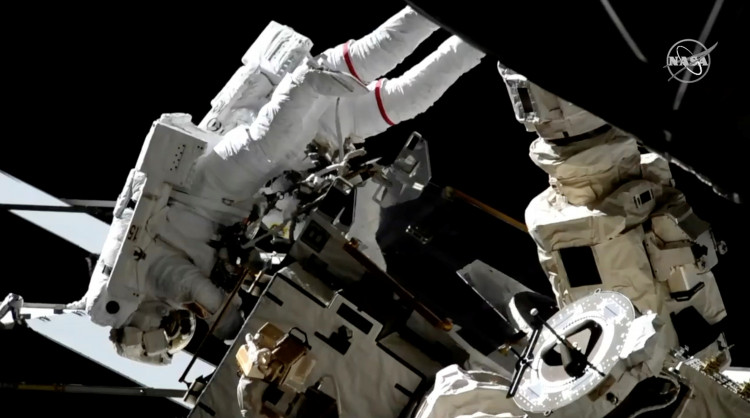Thursday's spacewalk went ahead as planned despite the fact that the International Space Station crew was awoken by a fire alarm at 10 p.m. ET Wednesday night.
Oleg Novitskiy and Pyotr Dubrov, Russian cosmonauts, have performed their second spacewalk in less than a week, as they continue to install the new Nauka module for ISS operations.
The spacewalk, which lasted seven hours and 25 minutes, began at 10:51 a.m. ET on Thursday and ended at 6:16 p.m. ET.
"A smoke detector was triggered in the Zvezda service module of the Russian segment of the International Space Station during automatic battery charging, and an alarm went off," Russian space agency Roscosmos said in a statement. "To eliminate possible smoke pollution by the crew, an aggregate filter for cleaning the atmosphere was turned on."
According to CBS News, the stench of burning plastic or electrical equipment drifted across the station's U.S. segment, said French astronaut Thomas Pesquet.
The crew reacted quickly, replacing air filters, and all traces of smoke dissipated, according to NASA. The source of the smoke, however, was unknown.
The cosmonauts are working on Nauka, a multifunctional laboratory module with extra room for study and sleeping accommodations, and this was their second of up to 11 spacewalks.
In July, Russia's freshly docked module accidentally fired its thrusters, spinning the ISS out of control. Onboard at the time were three NASA astronauts, two Russian cosmonauts, a Japanese astronaut, and a European Space Agency astronaut.
Dmitry Rogozin, the general director of Russia's space agency Roscosmos, told CNN that it was due to human error. On July 21, Nauka launched from Kazakhstan's Baikonur Cosmodrome and docked on July 29.
Meanwhile, a spacewalk with NASA astronaut Mark Vande Hei and Japan Aerospace Exploration Agency astronaut Akihiko Hoshide that was slated for Aug. 24 has been rescheduled for Sept. 12.
The August spacewalk was canceled a day before it was supposed to happen due to a "minor medical issue" with Vande Hei, according to NASA.
While no further details about the problem have been revealed, other than the fact that it was not a medical emergency, Vande Hei will now provide internal support during the spacewalk on Sept. 12 while he heals.






